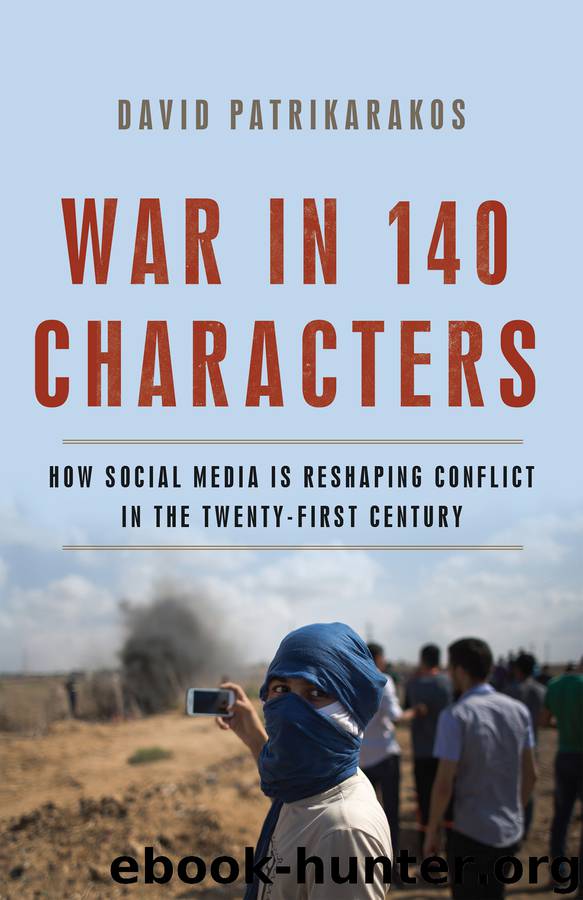War in 140 Characters by David Patrikarakos

Author:David Patrikarakos
Language: eng
Format: epub
Publisher: Basic Books
Published: 2017-11-13T16:00:00+00:00
7
THE POSTMODERN DICTATOR: ADVENTURES IN UNREALITY
Russian president Vladimir Putin understands the times in which he lives. When he annexed Crimea, Putin invaded and lopped off part of another country. His desire to steal other people’s land was atavistic. US secretary of state John Kerry called it a “nineteenth-century” move; it would have been equally at home in the ninth century.1 But his methods were irretrievably twenty-first-century.
Putin never officially invaded Crimea. No war was declared; no Russian soldiers ever officially crossed the border. Instead, several hundred troops marched into Simferopol and seized its regional parliament and Council of Ministers. They were masked and wore green uniforms without any identifying insignia. Of course everyone knew they were Russian, not least when they hoisted Russian flags over the captured buildings. Then, over the next few weeks, the “little green men” took control of the region, and on March 16, in a controversial, Russian-sponsored referendum, more than 96 percent of Crimeans purportedly voted to join the Russian Federation. Moscow had annexed a chunk of another sovereign state without officially invading it, or even firing a shot. It was, Putin said, democracy in action.
In one sense this is nothing new. The Russians call it maskirovka, military deception that “is carried out at national and theater levels to mislead the enemy as to political and military capabilities, intentions and timing of actions. In these spheres, as war is but an extension of politics, it includes political, economic and diplomatic measures as well as military.”2 Russia’s revered Marshal Georgy Zhukov developed it as a doctrine in the 1920s, but it is perfect for Putin, who is a new breed of autocrat.
In his book The Dictator’s Learning Curve: Inside the Global Battle for Democracy William J. Dobson argues that today’s successful despots are the ones who have understood the need to evolve. Totalitarianism is a fundamentally twentieth-century phenomenon. Idi Amin, Pol Pot, and Saddam Hussein are passé—they all tried it and they all failed. The yearning for democracy is, as the Arab Spring showed, global. Its promotion, as Dobson points out, is an international industry stuffed with an array of human rights, election monitoring, and development organizations, not to mention the passersby who will broadcast your every sadism to the Internet.3 Become too overtly homicidal and you are Syria’s Bashar al-Assad; wall yourself up from the world and you become North Korea’s Kim Jong-un.
Putin has internalized these lessons. You can behave to all intents and purposes like a dictator, but you must look like a democrat. Putin’s Russia has replaced Soviet brutality with more understated forms of oppression, scrupulously coated in a veneer of democracy and the language of human rights. He has replaced the gulag with zoning violations to shut down the offices of dissident newspapers, the firing squad with audits to bankrupt recalcitrant businessmen. Elections (though rigged) are observed; the constitution (though liberally interpreted) is sacred; opposition parties are created rather than banned. Democracy is “managed.” And you can’t go around invading countries or killing people en masse.
Download
This site does not store any files on its server. We only index and link to content provided by other sites. Please contact the content providers to delete copyright contents if any and email us, we'll remove relevant links or contents immediately.
The Secret History by Donna Tartt(18996)
The Social Justice Warrior Handbook by Lisa De Pasquale(12176)
Thirteen Reasons Why by Jay Asher(8873)
This Is How You Lose Her by Junot Diaz(6855)
Weapons of Math Destruction by Cathy O'Neil(6248)
Zero to One by Peter Thiel(5762)
Beartown by Fredrik Backman(5707)
The Myth of the Strong Leader by Archie Brown(5479)
The Fire Next Time by James Baldwin(5409)
How Democracies Die by Steven Levitsky & Daniel Ziblatt(5198)
Promise Me, Dad by Joe Biden(5127)
Stone's Rules by Roger Stone(5065)
A Higher Loyalty: Truth, Lies, and Leadership by James Comey(4937)
100 Deadly Skills by Clint Emerson(4898)
Rise and Kill First by Ronen Bergman(4757)
Secrecy World by Jake Bernstein(4725)
The David Icke Guide to the Global Conspiracy (and how to end it) by David Icke(4682)
The Farm by Tom Rob Smith(4484)
The Doomsday Machine by Daniel Ellsberg(4472)
